Have you ever imagined having a digital companion that not only comprehends your words but also delivers coherent responses? If not, consider ChatGPT, as that”s precisely the function it performs! In this opening chapter, let”s have brief overview of how ChatGPT evolved and some of its popular use cases.
The Evolution of ChatGPT
Just 5 days after OpenAI unveiled the web preview of ChatGPT, the service notched up a staggering 1 million users! ChatGPT”s succcess ignited a worldwide surge in AI innovation.
Since it first came out, OpenAI has been working hard to make ChatGPT even better. They started with a Pro version using the powerful GPT-4 model. After that, they added features like web browsing and creating images with Dall-E.
Now, ChatGPT is not just for chatting; it can do much more, for example, looking at the web and making pictures. This continuous evolution underscores OpenAI”s dedication to refining and expanding the capabilities of ChatGPT to offer users a dynamic conversational AI experience.
Use Cases of ChatGPT
People often call ChatGPT the “do-anything-machine” because it”s great for getting lots of different jobs done. If it can”t do something, it can probably tell you how to do it. Many users find it the best choice for all sorts of tasks, making it a top pick for general work.
ChatGPT has showcased impactful use cases across diverse industries. Let”s explore some of them in this section.
ChatGPT for Code Writing
Ever wished for a coding buddy? Developers are leveraging ChatGPT as their coding companion, utilizing its capabilities to streamline the writing, understanding, and debugging of any code.
ChatGPT is becoming an essential tool in the coding process, offering valuable guidance and support throughout development tasks.
Example
Letâs check out an example below that generates a Python program for reversing a string −
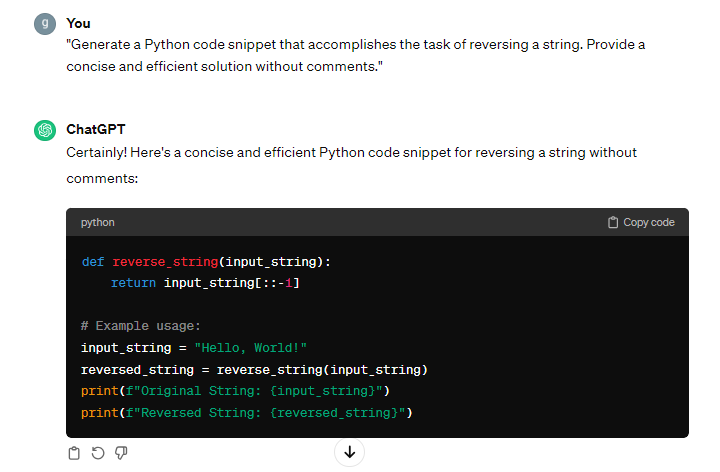
ChatGPT for Content Creation
Make writing fun with ChatGPT! Creators are using ChatGPT to unlock their creative potential. Whether they are crafting stories or blogs, it assists in generating engaging content, providing inspiration, and simplifying the writing process. It also assists in summarizing the book or article.
Example
Letâs check out an example that writes a Facebook post description about free online courses for AI with Python −
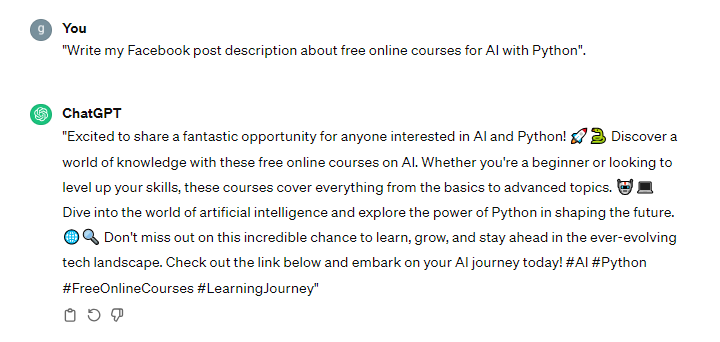
ChatGPT for Marketing
Businesses are using ChatGPT to elevate their marketing strategies by creating custom marketing plans or strategies. It actively contributes to crafting ads, writing appealing content, and adapting to trends, making it a valuable ally in enhancing brand image.
Example
Here is an example in which we are using ChatGPT to write Google Ad headlines and descriptions for IT company −

ChatGPT for Job Seekers
Job seekers are turning to ChatGPT as their career coach. They are utilizing this LLMâs capabilities to craft resumes, write compelling cover letters, and prepare for interviews by answering interview questions, finding valuable support in their job search journey.
Example
Letâs see how we can use ChatGPT to write a cover letter for a software engineer role −
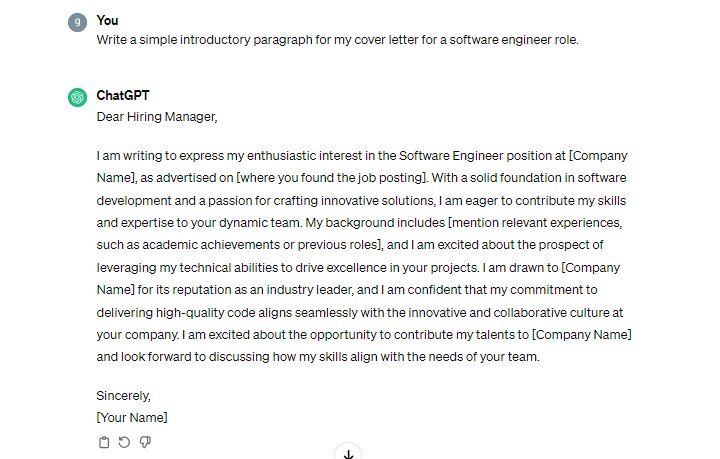
ChatGPT for SEO
Online content creators are using ChatGPT to enhance their SEO efforts. It actively generates SEO-friendly content, meta descriptions, and blog posts, ensuring that their online presence is easily discoverable by search engines.
Example
In this example, we use a prompt to generate 10 long-tail keyword ideas for a business that provides IT solutions to other businesses −

ChatGPT in Healthcare
Professionals in the healthcare sector are integrating ChatGPT into their workflows. They are using it for clinical decision support, medical recordkeeping, and disease surveillance, information retrieval, and as a virtual assistant, improving overall efficiency in healthcare tasks.
Example
Letâs see an example in which ChatGPT compare the efficacy of two different approaches for chronic pain management −
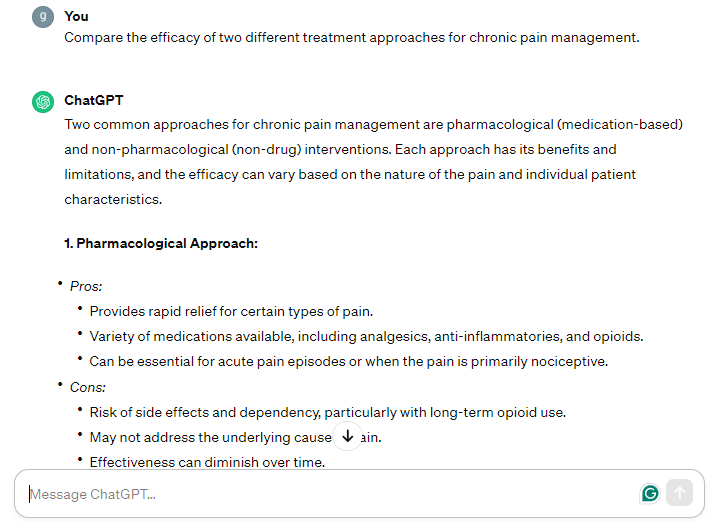
ChatGPT for Customer Service
Make talking to companies easier with ChatGPT! Companies are incorporating ChatGPT to simplify customer interactions. They are using it to assist with queries, provide information, and ensure a positive user experience, enhancing the quality of customer service.
Example
In this example, we as a Grocery Store, assisting the customer and offering solution through ChatGPT −
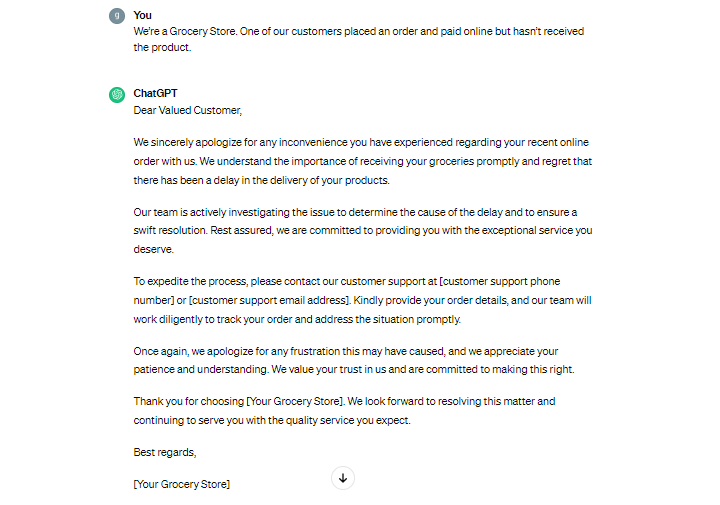
ChatGPT for Education
ChatGPT is like a study buddy! Students and educators alike are using ChatGPT as virtual tutors. It assists in explanations of complex subjects, answers questions, and makes learning interactive across various subjects, providing valuable support in educational contexts.
Example
Letâs see how ChatGPT summarize the life of Mahatma Gandhi for students and teachers −
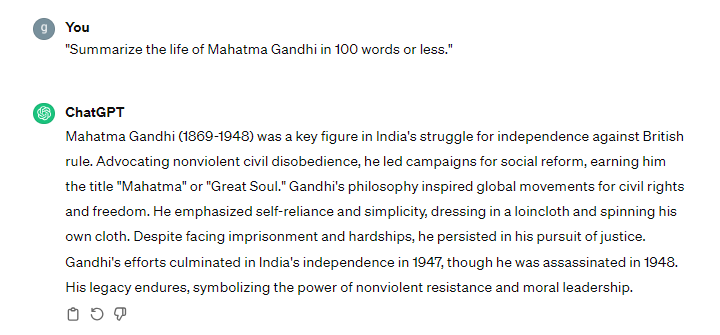
ChatGPT for Entertainment
Writers and creators are using ChatGPT to spark their creativity. It actively contributes to generating plot ideas, video game storylines, writing movie scripts and dialogues, and creating engaging content, making it an invaluable tool in the entertainment industry.
Example
In the example below, ChatGPT is writing a short story having Basketball the main character −
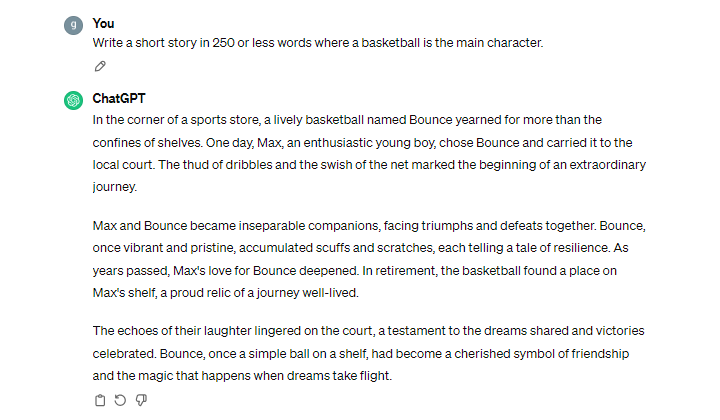
ChatGPT as Your Daily Assistant
Meet your everyday helper! Individuals are relying on ChatGPT as their everyday helper to make their daily tasks seamless and enjoyable. They are using it for weather updates, setting reminders, and obtaining quick answers to queries, making exercise and diet plans.
Example
Letâs see how we can get some nutritious vegetarian recipes from ChatGPT −
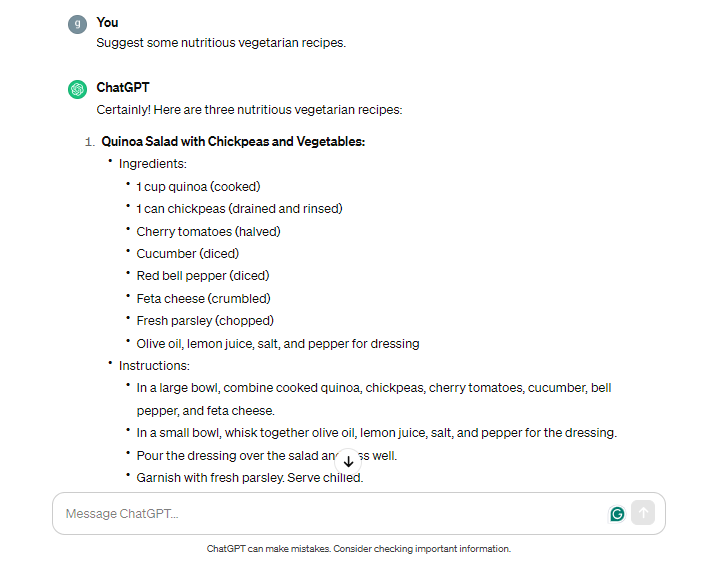
Other companies are observing the widespread popularity of ChatGPT, a part of a wave of so-called generative AI, and are exploring ways to integrate LLMs into their products and services.
Microsoft, a strategic partner of OpenAI, has seamlessly integrated this technology into its core products, such as the MS 365 Suite. Bing, the search engine adopted GPT technology to rival Googleâs dominance.
Google has incorporated conversational AI features into its primary search product and unveiled its chatbot named Bard which is powered by LaMDA (Language Model for Dialogue Applications).
We will cover these use cases in detail in the subsequent chapters.
Limitations of ChatGPT
As an AI language model, ChatGPT demonstrates its prowess in an array of tasks such as language translation, songwriting, research queries, and even generating computer code. This versatility positions ChatGPT as a popular tool for various applications including marketing, daily assistant tasks, healthcare support, SEO optimization, and customer services.
Despite these capabilities, it”s important to acknowledge that ChatGPT, like any AI technology, comes with its set of limitations. In this section, we will explore some limitations of ChatGPT, ranging from limited context understanding to potential for creating inappropriate content. Understanding these limitations provides insights into the challenges one might encounter when employing AI language models across different domains.
-
Limited Context Understanding − ChatGPT may struggle with nuanced or lengthy contexts, leading to responses that lack understanding beyond a certain point.
-
Potential Bias in Outputs − ChatGPT may inadvertently generate biased or sensitive content, necessitating caution in applications to ensure fairness and inclusivity.
-
Inability to Verify Information − ChatGPT may generate information that is factually incorrect or unverified, highlighting the need for external fact-checking to ensure accuracy.
-
Tendency to Over Generate − Prone to verbosity, ChatGPT may produce overly detailed or verbose responses, affecting clarity and efficiency in communication.
-
Lack of Real-world Knowledge − With a knowledge cutoff date, ChatGPT may lack awareness of recent events or updates, potentially providing outdated information.
-
Sensitivity to Input Phrasing − Responses can vary based on slight changes in input phrasing, leading to inconsistency.
-
Potential for Inappropriate Content − Despite efforts to filter inappropriate requests, ChatGPT may inadvertently generate content that violates ethical or community standards.
Legal and Ethical Issues in Using ChatGPT
Below find the legal and ethical concerns associated with the utilization of ChatGPT and other extensive large language models −
Legal Issues
-
Liability − It is a challenge to determine the responsibility for any unintended consequences of using ChatGPT. There should be clear legal frameworks to establish accountability.
-
Intellectual Property − There is a necessity to have strict policies in order to navigate copyright laws and ensure compliance.
Ethical Issues
-
Privacy − ChatGPT interactions might sometimes involve sensitive data.
-
Transparency − It”s vital that the users remain fully aware regarding the drawbacks of ChatGPT during their interactions. There must be clear disclosures about the AI system”s nature and limitations to manage expectations.
-
Security Risks − ChatGPT can be vulnerable to adversarial attacks and data breaches. There is a requirement for robust security measures such as encryption and continuous monitoring.
Addressing these issues requires ongoing collaboration between developers and regulators in order to establish proper legal frameworks and ethical guidelines.